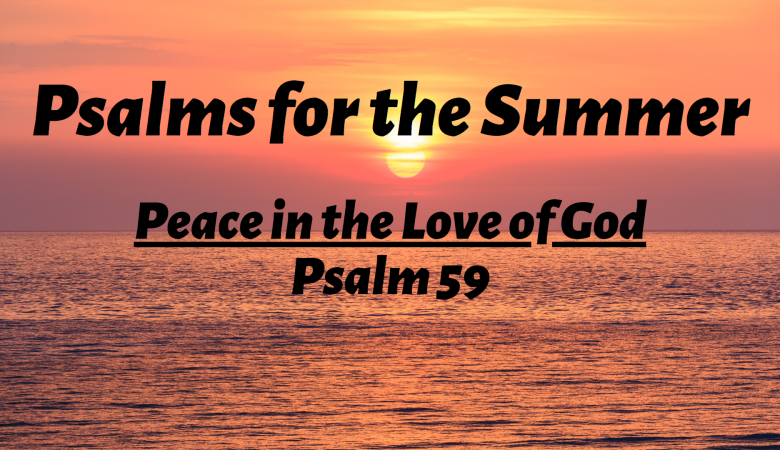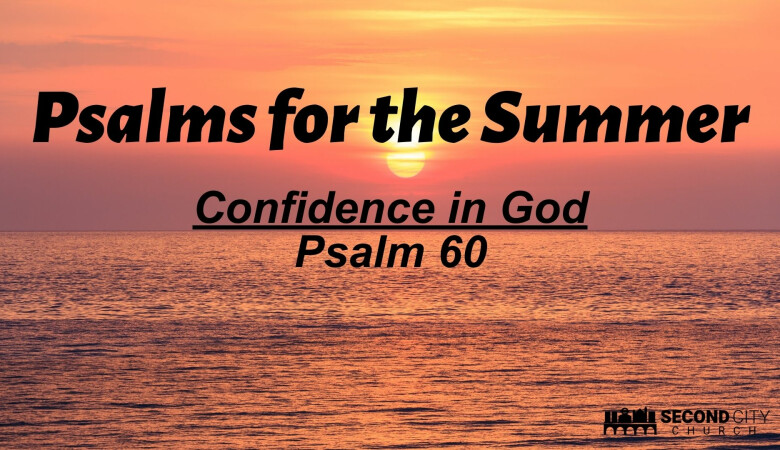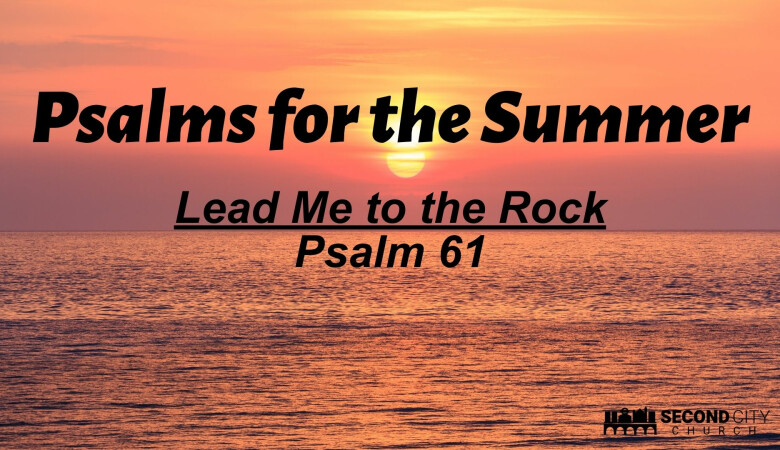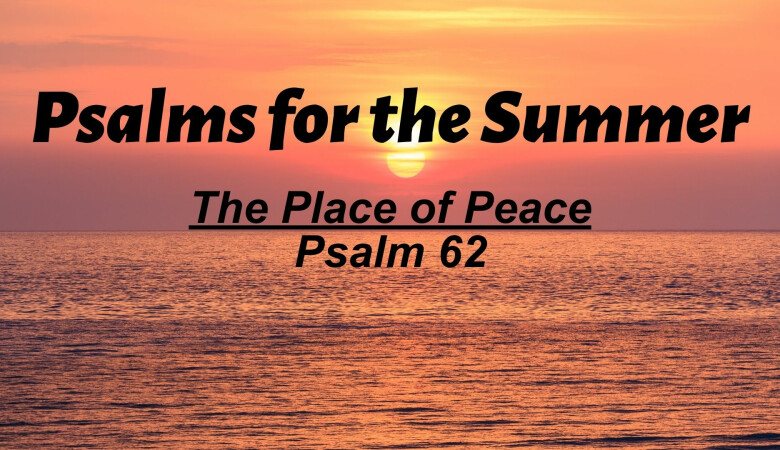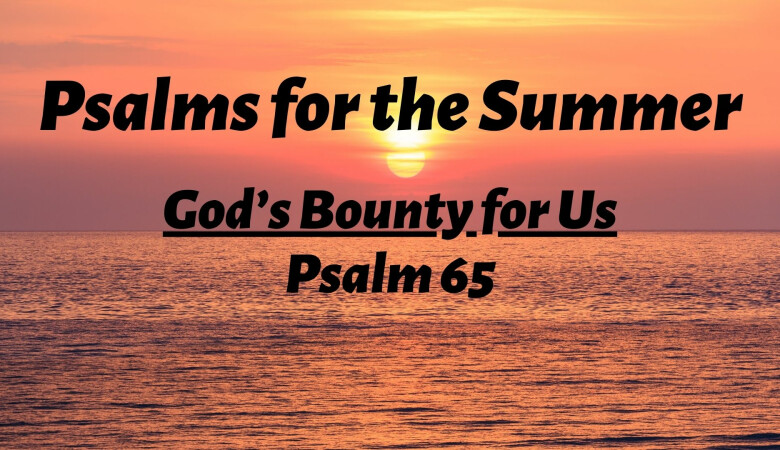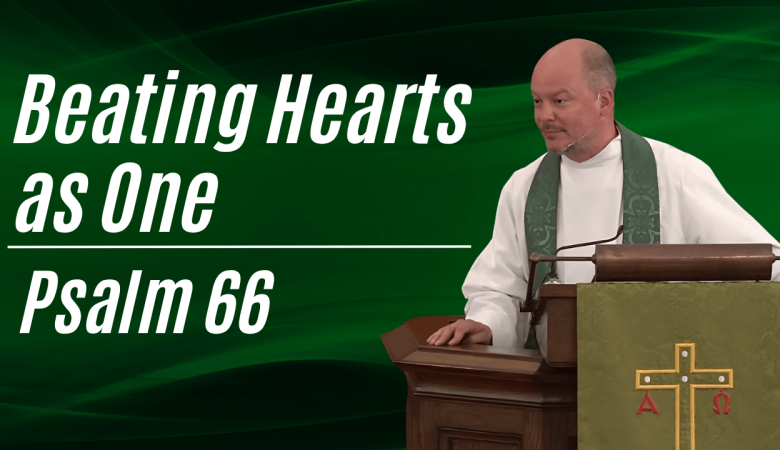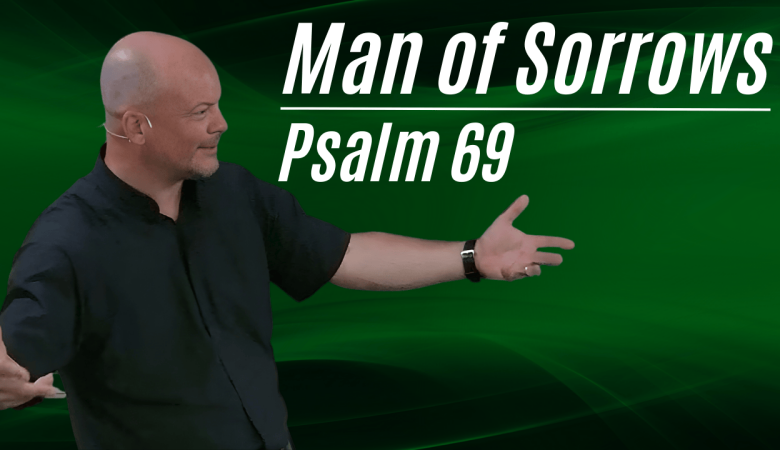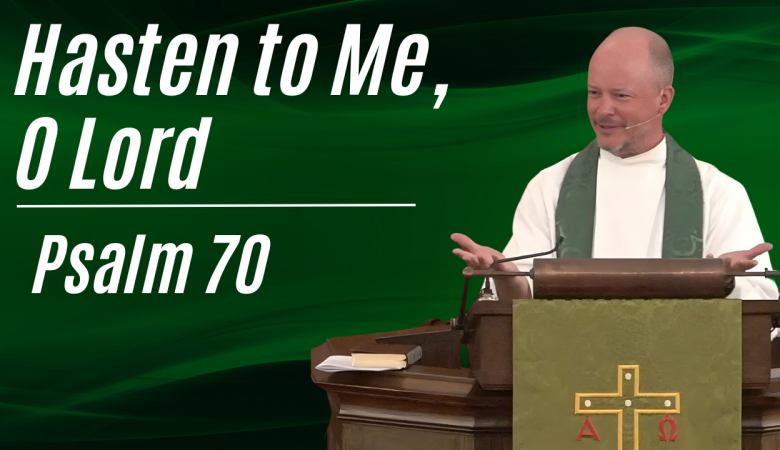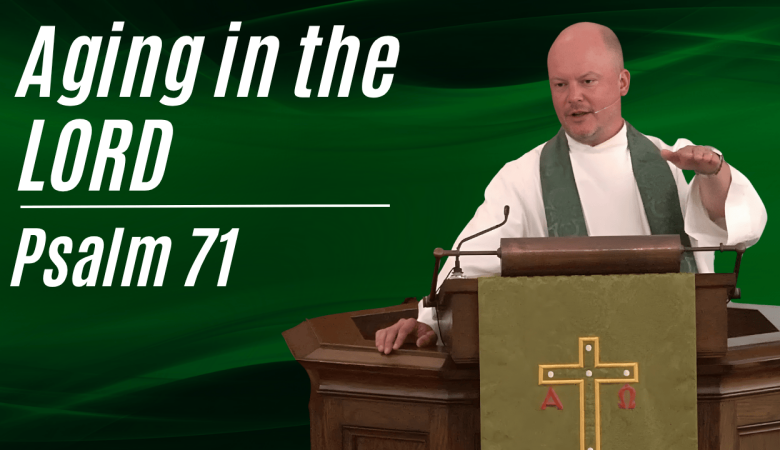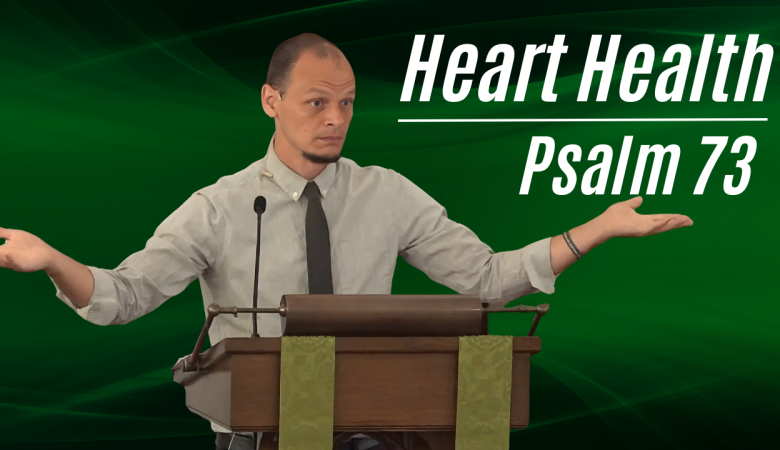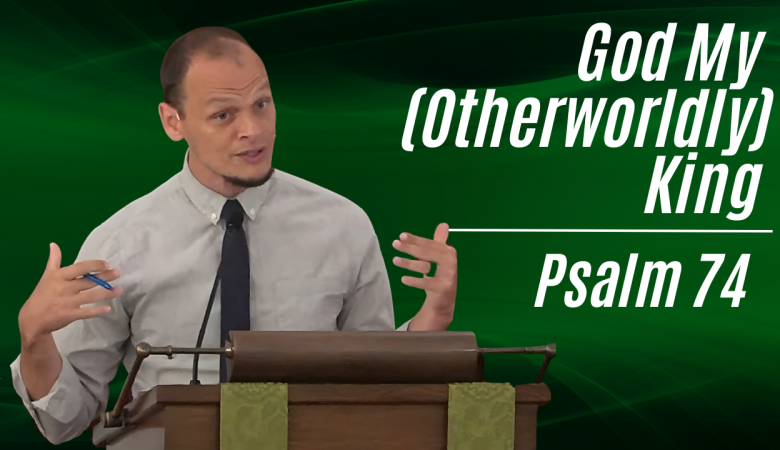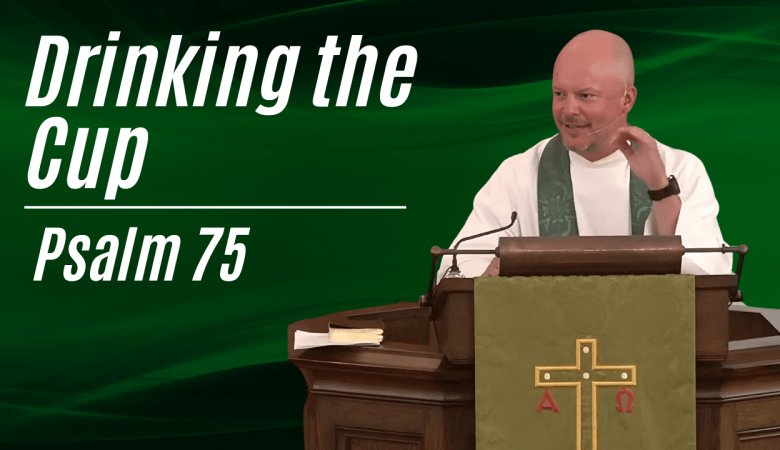Series: Psalms for the Summer
The Seated King
July 06, 2025 | Peter Rowan
Passage: Psalms 68:1-35
Summary
Psalm 68 is a majestic psalm of praise celebrating God's deliverance and establishment of His people in the promised land. Likely written by David for the procession of the Ark of the Covenant to Jerusalem, it recounts God's journey with His people from Mount Sinai through the wilderness into their new home. The psalm has played significant roles throughout church history, even becoming known as the 'Protestant Psalm of Battles' during the French Wars of Religion.The psalm addresses the challenging topic of the Canaanite conquest by emphasizing three key perspectives: it was God's doing rather than human conquest; it represented divine judgment on extreme wickedness coupled with divine grace; and grace was extended even in judgment, as seen in Rahab's salvation at Jericho. Throughout the psalm, God is portrayed as the defender of the vulnerable - father to the fatherless, protector of widows, and one who brings the lonely into families. Ultimately, Psalm 68 points to Christ and His ascension, foreshadowing the vision in Revelation where people from every tribe and nation worship before the Lord. It invites us to long for Jesus to rule with justice while welcoming all nations into His family through grace.
Transcript
Let me pray for us again as we begin. Lord God, we have this psalm before us, this lengthy psalm, this psalm that speaks of your deliverance and your establishing yourself in your promised land and for your people and the glory of Mount Zion, because you dwell there, and how all peoples will come and worship you. And we think, Lord, of how this psalm is most fulfilled in Jesus God. We pray that even as we look at this long psalm, God, that we might have a little bit better understanding of it, but even more so, Lord, we might have a greater awe of your grace and your kindness and your love for us in Christ, in whose name we pray. Amen.
All right. I have mentioned before that the last house that I lived in in college had a fair amount of beer brewing going on in that house, and it was above board. I'm not going to get into all the details of it because it's not really pertinent necessarily, but some of you know that when you're brewing beer, you have some downtime. You know, there's different times where you're supposed to put the hops in or the different additives, but then there's some times where you're just waiting for it to do its thing. And so one of the things that we would do while we were waiting is we, as a group of guys living in this house together, would sing together.
And we had a great front porch, and quite a few of us played. Most of us played different instruments, and we would sing songs together. And one of the songs that we would sing was Psalm 68.
And so for me, this Psalm has this fond memory. And for the most part, the reason for this was really just practical. Psalm 68 is pretty long, right? It took a little while to read it through. This is the hymnal that I have it in currently, and I'll show you how long.
So Psalm 68 in this hymnal, this has most of the Psalter in it. This is one verse, okay? So this is six verses, and then this is another six verses. And I timed it. It's 12 minutes long, so it kills a lot of time.
It's a psalm with a personal history there.
Unlike a lot of psalms, though, actually, that we're going to look at even this summer, like what we looked at last week and the one we'll look at next week, it's not so much reflecting on the life of the individual believer with our doubts and our joys and all the different things that affect us in this life. Instead, it sort of has this broad horizon of what God has done. What he's doing and, and what's going to happen. That's more the idea of this psalm, and specifically this psalm we're going to talk about this a little bit, is a psalm of procession. It actually mentions that a couple times.
This was a psalm almost certainly written by David for the procession of the Ark of the Covenant to Jerusalem. So it's a psalm with a history again, a bigger history.
It's also a psalm with a ecclesial history, a history within the life of the Christian Church. Psalm 68 was sung by Savonarola and the other Dominicans as they were forcibly marched to the great plaza in Florence where they would meet their death, where they were burned to death. Why? Because they preached against the excesses of, of the Pope. Some of those excesses which I read about this week are not even appropriate for a sermon with most of our children gone.
If you want to hear about them, come ask me afterwards. But this, this psalm was what he was supposedly singing as he made his way to his death, having been sort of a precursor to the Reformation, calling out the errors of the Pope. This psalm also Psalm 68 was, has been known as the Protestant Psalm of Batt.
Some of you might know what is the Battle Hymn of the reformation. Anyone?
Psalm 46, particularly Martin Luther's A Mighty Fortress is Our God is known as the Battle Hymn of the Reformation. This psalm is known as the Protestant Psalm of Battles. Many of you probably are at least aware, some of you may be maybe fairly aware of French history and Protestant Reformation history. One of the more kind of saddest parts of church History is the second half of the 16th century in France.
I studied in France right after high school for a year and then actually after college for another semester. And I attended a church there which was called l' Eglise de Rue de la Masse, which is actually the church on the road of the Mass. And it was a church that was founded by one of the seminarians from Calvin Seminary in Geneva. That was that. They were then sent out through the French speaking world to plant churches.
And this church was planted by one of those guys. And they actually had the original letter that Calvin had written to this young church encouraging it to continue on in the proclamation of the good News that you're saved not by what you have done, but by the work of Christ alone, the necessary work of God. When I was there also, we went on a little university student retreat for a weekend down to the Cevennes Mountains, which are in the south of France. The Cevennes mountains were one of the Huguenot holdouts because it was so mountainous they could hide in order to preserve their life. And that was one of the places where they hid.
Well, if you're familiar with sort of that part of French history, which I know that's sort of like a niche thing. Okay. But maybe you've heard of the St. Bartholomew's Day massacre, because actually the situation had gotten so bad in the second half of the 16th century between the Catholics and the Protestants that actually, as was done, the King's sister Margaret, who was a devout Catholic, was fell in love with a Huguenot prince, probably not forcibly asked to marry Henry III of Navarre, who was a Protestant king, in order to in some ways repair this great schism that had happened. Violent, violent wars that were taking place between the Catholics and the Protestants in France. Well, what happened is that many of the, many of the Huguenot, which was the French Protestants, came to Paris to celebrate this union, this marriage that was supposed to repair these breaches that had led to all these battles.
And about 30,000 Protestants in France were slaughtered on St Bartholomew's Day there in Paris.
The wars of religion in France lasted from about 1562 to 1598, which is a few years after Henry IV. Henry III's of course, son signed the Edict of Nantes, which gave a lot of the Protestants certain rights in France, which was supposed to lead to the end of the wars of religion. Anyway, that same year that began the wars of religion, which is 1562, there was a tune that was put to Psalm 68 in the Genevan Psalter. And that is the tune that I just showed you. It goes, God shall arise, and by his might put all his enemies to flight.
In conquest shall he quell them. That was written by Mathis Greider. He was the church musician living in Strasbourg in German speaking France. Okay, there's a good reason for why I'm telling you all this, and it's not so that I can give you a weird church history quiz afterwards. Okay?
What I'm saying is that Psalm 68 is a Psalm with a history. And some of that history is very wonderful. For me, it brings back just these great joyous times with my friends in college. Some of it brings back for me fond memories. And then actually there's another part of it that actually makes me deeply sorrowful because my primary teacher that taught me French history when I was living in France, her name was Madame Serrati, she said that she was among the millions and millions of French people that said this, je suis catholique mais je quoi pendieu, which means, I am a Catholic and I do not believe in God.
And she said, why would I say that? Why would she say that?
Because of the violence done in the name of religion. I mean, that's probably not lost on anyone today. I would guess that all of you have people that you think they would say, okay, culturally, I will say, blah, blah, blah, but this is a farce. Because of the violence done in the name of God, that tune was actually outlawed for a little while, particularly in Paris, because whistling that tune meant that you were part of the Protestant Reformation, and it led to conflict, to violence. God shall arise and by his might.
Now, here's the odd thing. I want you to keep your Bibles open, okay? Please keep your Bibles open. We're going to try to look at this long text, and I know we don't have a lot of time.
One of the things I want you to see first is that Psalm 68 is a celebratory psalm. If you look up, what category of psalms does Psalm 68 fall into? It falls into the Psalms of Praise. Psalms of Praise. It begins, God shall arise, his enemies be scattered.
But then quickly it says, Verse 4, Sing to God, Sing praises to his name. Lift up a song to him who rides through the deserts. His name is the Lord exalt before him. If you go down actually to the next real significant section, break, actually, verse 19, blessed be the Lord who daily bears us up. God is our salvation.
You look down again, further down towards the end, verses 34 and 35 ascribe power to God, whose majesty is over Israel and whose power is in the skies. Awesome. Is God in his sanctuary? The God of Israel? He is the one who gives power and strength to his people.
Blessed be God. It's a psalm of praise. And it's a psalm of praise that is celebrating how God led his people through the wilderness. Kind of has these echoes of Mount Sinai, where the Ark of the Covenant itself was built, and how he brought them through the wilderness, how he brought them into the promised land.
Nearly everybody, as I said, says that Psalm 68 was most likely written to commemorate the event of when David and the whole procession brought the Ark of the Covenant from Obed Edom up to Jerusalem. Which is to say what they're saying is, finally God. You did. You're at home now. You're settled.
You've brought us in to this promised land, and we're following you to your home in Jerusalem. So here's what I sort of want to do. I want to give you a little outline of this psalm, but I want us to particularly sit in the second section for a little while. Okay. Because I kind of want to speak to something that is prominent there.
But if you have your Bibles open still, what you'll. You'll see some breaks here, and I want to kind of point them out to you. Verse 1 through 6, most people take to be sort of the introduction of this psalm. You know, this is a long psalm. It's kind of giving you a little introduction.
And even in that introduction, it's giving you a short outline for how the psalm is going to go. So it says, you know, they praise God. They speak of how his enemies are nothing before Him. They speak about how life is lived as it's meant to be lived. It says specifically, his enemies scattered before Him.
He's the hope of the helpless. It says, the Father to the fatherless, defender of widows in their distress. That's verse five, verse six. He cares for the lonely. God settles the solitary in a home.
He cares for the prisoners. He leads out the prisoners to prosperity. And he actually deals with the rebellious. What we have here in this little bit are sort of marks of what a great leader does. But it's also introducing for us the entirety of the rest of the psalm.
It's breaking up the rest of the psalm, which is broken up into primarily God dealing with his enemies and God being established as the true king for which we long. So then we turn and verse 7 to 18 then recount for us much of this kind of movement of God, first with his people at Sinai, through the wilderness, and then into the promised land. And then verses 19 through 31 again speak to us about that idea of God being on the throne. So verses 7 to 18 first, which is recounting for us this movement from the wilderness into the promised land. Verse 7 there speaks specifically of God being in the wilderness when you marched through the wilderness.
But then verse eight moves to actually God establishing his people in the land. And specifically that verse 8 actually quotes from part of the Song of Deborah that is found in Judges, chapter five. Okay. When Sisera's army is destroyed by the heavy storm. So it actually, verse nine kind of follow.
Follows on this idea. Well, let me read verse eight. The earthquake, the heavens poured down. Rain before God, the one of Sinai, before God, the God of Israel. Rain in abundance.
O God, you shed abroad. You restored your inheritance as it languished. So that word inheritance is referring to the land, the Inheritance of Abraham and his disciples. And it's saying he brought them in in part through this destruction of other people, namely Sisera, and through the prophetess Deborah.
By the way, we don't have a lot of children here. That story is one of the crazy stories of. Of the Bible too, because maybe some of you remember Jael taking the tent peg and actually pounding it into the head of the commander to kill him. So it's inviting us to remember how God actually brought his people into the land, into the promised land, through the judges like Deborah. And of course, you're supposed to also think of some of the other judges, and you're supposed to think of Joshua and all this other story.
But part of what it's doing for us is bringing to mind some of the very violent things that took place when God brought his people from the wilderness into the promised land. And how specifically God does it, how are they saved? But it's by a rainstorm. God brought that. Okay, we're going to get to some of that.
Let's continue on verses 11 to 14. They repeatedly reference the kings.
The women who announce the news are great. The kings of the armies, they flee, they flee down below. This is kind of interesting. It's talking about how the mountain of God is not the mountain that you expect, but it's Mount Zion. But it also references how God has his chariots, which should evoke in us the memory of the chariots of King Pharaoh.
Right. There's this dynamic between the different kings that are taking place and how God is establishing himself against the kings there in Canaan, which is supposed to invite you to think of, you know, the king of AI and Joshua. Or maybe you're supposed to remember the story of Jericho. You're supposed to call to mind the story of Sisera, like we just heard with Deborah, God leading his people into the promised land. When we think of Bashan, we're supposed to think of the OG king of Bashan, of which God, you know, in the story there where God brings his people again into the promised land by conquering those other kings and their kingdoms.
Okay, now here's the thing. As you sit in that. In those stories, and as I try to bring some of these stories to your mind, I'm guessing that most of you know that this subject that we're talking about is one of the hardest subjects in the Bible. I mean, my guess is that actually, I would guess that every single person in this room at least knows someone that would say one of the reasons why they think the Bible is not to be trusted and the story of Scripture is not to be believed is because of the Canaanite conquest of which this psalm is bringing to mind for us. That's actually partly why I wanted you to hear this story, even of how this psalm has intertwined with these wars of religion and these religious conflicts that led to so many deaths.
What this psalm is celebrating is what many people find to be one of the great reasons for rejecting the Christian faith and rejecting the Bible.
What this psalm is celebrating, at least in a way, is the conquest of the Canaanites.
So of course we have folk like the very well known atheist Richard Dawkins, who writes things like the God of the Old Testament is arguably the most unpleasant character in all fiction. Jealous and proud of it. A petty, unjust, unforgiving, control freak, A vindictive, bloodthirsty, ethnic cleanser, misogynist, sichomophobic, racist, infanticidal, genocidal, filicidal, pestilential, megalomaniacal, sadomasochistic, capriciously malevolent bully. I did practice reading that out loud because there's a lot there.
And what we must do as people who actually say, the Lord does reveal Himself and He's given us his word because he loves us and actually longs to live life with us, we must say, what do we do? How do we have a text that celebrates this story in a way and yet also leads so many people down that kind of road?
Because here is the fact. Throughout the centuries of the Christian church and the Christian life, leaders have used texts like this for all kinds of evil. I mean, it is unquestionably the case. I mean, many, many people believe that the French Revolution actually had its beginning more in how the French Reformation happened and these wars of religion and the rejection of God. But of course we can think of the effects of these kinds of texts, not just the crusades against the Muslims.
We can think of genocides, of the Native Americans here in North America. There are aboriginals in Australia. We can think of apartheid in South Africa. We can of course think about the various discriminations here racially in our own country, primarily against African Americans, but plenty of others. We can think about the troubles in Northern Ireland.
We can list so many ways, so many ways in which some of the story that is alluded to here and celebrated here has led to so much violence and so much harm. It's a long list.
And here's the truth. Actually, I can't speak to all, I can't give you all the reasons why I still Would say, believe in the Lord, trust his word, his ways are good. He is full of love and truth and goodness and beauty. Can't speak of all the things that I would like to speak to because you guys would probably leave for lunch. I mean, I would love to show you how the judgment on wickedness is not just an Old Testament thing.
In fact, Jesus, you know the word for Gehenna, the place of fire outside of Jerusalem, where things would be burnt out. That is a reference to hell in the New Testament. Of the 12 times that that's talked about, 11 are from the mouth of Jesus. So that's something you got to think about. I mean, I'd love to show you, as we've looked at in our adult Sunday school class, somehow the New Testament is always saying the Old Testament is authoritative and those stories are true and good, and therefore our learning and our belief.
I would love to show you how these cannot be taken as allegorical stories. These are not made up for some moral lesson. I can't go into all those things, but I think I can go from this text into a couple things that I think are important, okay. As we address the question of the Canaanite conquest. And the first thing is that this is God's doing and not ours, which is to say this isn't just some holy war, but it's.
But it's God's doing. The whole psalm actually, right from the very beginning, right? It says, God shall arise and by his might put his enemies to flight. Or it says, God shall rise, his enemies shall be scattered, and those who hate him shall flee before him. The whole emphasis in this psalm is what God does.
And I wonder if you were very attentive when Don was reading for us from the Book of Numbers. This verse, this first verse in. In Psalm 68 is nearly a direct quote from Numbers. Chapter 10, verse 35, it says this. And whenever the ark is set out or sets out, Moses said, arise, O Lord, and let your enemies be scattered, and let those who hate you flee before you.
This psalm is beginning with the very phrase that Moses said. Every time the ark of the covenant went out and led God's people, it was saying, we are following you. You're the one doing the action. Where are your people that you're bringing into this land? From the very outset of this psalm, what it's telling us is this.
This is not God's people saying, we're going to go and conquer them. They need to submit to us. You look down at verse seven, you see this idea again. Of course it says, oh, God, when you went out before your people, when you marched through the wilderness, it's saying, God's leading his people in this way. Okay?
Verse 21, it says, but God will strike the heads of his enemies, the hairy crown of him who walks in his guilty ways. So this is not like, hey, God, deal just with my enemies like this. This is saying, actually, God is the one who is the actor here, okay? Which is why, if you think with me again, back to the story of AI, you should also think with me about the story of Achan, who was a part of Israel, but he took some of the plunder of the city and was judged for it. Because this whole God bringing his people in was not so that they could just line their pockets.
This was not about them. This was about God. He was the commander. He was the one that was in charge. So verse 30 tells us, trample underfoot those who lust after tribute, scatter the people who delight in war.
God is saying, you cannot delight in war. This is not about taking joy in another's misfortune.
This is related to the second point that I want you to see this morning. And this is an important point. This is not about some human conquest. This is divine judgment. But this is also a reference to divine grace.
Okay? Divine judgment, but also divine grace. Some of you know this. That God had told Abraham that this would be his land. But actually, way back In Genesis, chapter 15, he says, the sins of the Amorites, which were, you know, related to the Canaanites living in Canaan there, has not yet reached its full measure.
So way back in Genesis, when God had first called Abraham, he said, you can't have this land yet because their sin is actually not so bad that their land should be taken from them.
That means that the wickedness of that society at the time of Abraham was not yet so wicked as to morally justify God acting on complete judgment. God himself actually says they are not so evil that it would be right for me to act this way. And yet, so we can say this, okay, all humans and all societies are sinful in one way or the other. But there are times when the extremes of wickedness call for a particular judgment. And I would actually say that pretty much everybody in this room agrees with that idea.
Whether you want to admit it or not, there's a time when there's an extreme of wickedness that invites a certain judgment. I have stood in the furnaces built for human bodies in Dachau. I'm telling you, if you stand in that place it is hard to deny that fact that there is an extreme wickedness that invites an action.
We know that the time had come when the wickedness of the Canaanite people had rose to a state where God must bring about its own. And we know that actually from the Old Testament. We actually also know it from other histories outside of the Old Testament. The Canaanite people were a particularly wicked people, even in sort of ancient Near Eastern standards. Here's an interesting thing.
Those evils that they were particularly known for are these cult prostitution, so fertility cults and child sacrifice, so offering up their children to be burned in their cultic practices. So you had the combination of massive sexual sins that were related to worship, their fertility cults, along with the idea that many of those people who were expecting babies were killing them to their very gods. That's what we know what was going on, particularly in the Canaanite culture. Okay, so hold those things together.
And when you come, okay, hold. Hold these two things together. God is the one who's doing it. And he's saying this a lot. And it's not about lining their own pockets.
Think of Achan in. In Joshua, chapter six or seven. Think of that story of God actually bringing judgment on his own people for trying to take from these wars. And now I want you to think about. So I want you to think about how God is doing this and also how it's a particular judgment, primarily because of the wickedness of the Canaanites had gotten so bad, particularly around the idea of cult prostitution and child sacrifice.
And then I want you to think about what is the very first thing that happens when God's people cross the Jordan into the promised land? What's the battle that takes place? Jericho. Jericho. What do the people of God do at Jericho?
Do they draw swords? No, they don't. They walk around and they blow trumpets and God does the rest. It is not about them. Not about them.
Who is saved at Jericho?
I feel like I heard some Rahab. Yeah, Rahab. What does Rahab do? What's her job? She's a prostitute, which means that she is the very embodiment of the evil of the Canaanites.
She's it. I mean, cult prostitution, child sacrifice. She would have been the one that embodied what God said. You deserve my judgment. And frankly, very few people would totally say, yeah, somebody like that doesn't deserve some level of stopping.
Who gets grace there? Rahab, actually, in her whole family, it extends beyond her.
What I'm suggesting to you is that even in this story, did you Notice that the maidens are the ones that are playing their tambourines as the procession is making its way in. Can't you imagine that maybe some of those are Rahab's very descendants who are celebrating what God has done, bringing an end to such evil, but also extending unbelievable grace to the world? World. All you have to do is turn to him. Actually, that's part of the story later on in the Gibeonites too, right?
Come and be part of this family. It's not an ethnic. It's obviously not an ethnic cleansing. Otherwise the very first story would not include, say, hey, you can totally be a part of our. It's not about ethnicity.
None of it's about it, but God acting and God bringing an end to evil, but also God extending his grace, the very embodiment of that evil.
So I'm gonna wrap this up. We come to the second half of this psalm, right? I said it kind of breaks up verses 1 to 6, 7 to 18, 19 to 31. And then you have the end there, which kind of wraps it around. But that second section we have in the second section is, you know, this procession comes up to Mount Sinai, and then they celebrate that God is on the throne, that he's the one that's there.
And you have everybody coming, and you have them offering tribute, and you have the nations, verse 20, you know, I mean, verse 18 talks about. Or 17, rather. You know, the Ark of the Covenant is now in the sanctuary. And what you have is that the virgins are celebrating. You have all this kind of stuff.
But then also it says you have the princes, the princes of Judah and Benjamin and Zebulun and Naphtali. They're all coming and they're worshiping and they're bowing down. They're saying, you're the true king. You're the one who reigns properly, not us. Because if we do it in our own power, it only leads to destruction and chaos and all this.
But then, interestingly, you also, at the very end, or near the very end, verse 27, or verse 31, rather, it says, nobles shall come from Egypt. Again, it's the place of God's enemies. Actually, they're being welcomed into this family. It actually says also cush, which is even beyond Egypt. Think of South Sudan, maybe that.
That area actually is probably Kush. Everybody, you're all welcome here. The very enemies of God are welcomed into the very place, the abode, the house of God. And everybody together there at the end says, blessed be God. Why?
Because if you think through this great story. And if you think actually of the conquest and even beyond actually, if we have our sort of historical lens on, we know that God actually does bring the same judgment on Israel. When they go against God's ways and go and worship as the nations worship, they're going to get kicked out of the land too, if they don't actually abide by God. But everybody, they're invited to say, hey, God is full of grace, but he does not permit wickedness. He doesn't love the ways of just doing whatever you want.
Come to him and turn and repent and have new life. This is what's on offer here. The Egyptians are welcomed, the Rahabs are welcomed. The Peter Rowens are welcomed. You're welcomed into this new family where God reigns with justice and with grace, hating wickedness, loving righteousness.
What I'm saying is that this psalm is a psalm of a history. Of course, it has like, my own personal history, and it has the history of the church, but it has this great history that God is telling us of how he brings his people into the promised land, how he does away with evil, how he cares about things being done right. But he also extends grace to the worst of the worst, invites them into his family. And all of this we see most of all in Christ. It is.
This is a story. Almost everybody I read said, this is about the ascension, Jesus finally going and sitting on the throne. And if you have ears to hear, you might have heard the echoes from this psalm, even that we hear in the book of Revelation, where the nations themselves bring their tribute before the true king, where people from every tribe and tongue and nation, this is not an ethnic thing, come and fall down before the Lord, their God, where grace is extended beyond any border that you might think people are brought in. Where the healing of nations exists because the tree of life is there, because the Lamb is slain. The Lamb who was slain is right there in the middle.
This psalm prepares us for what we are all actually most longing for. The true king, the father to the fatherless, the defender of widows, one who meets the lonely, brings them into his family, friends. I wanted to kind of give you this sermon in a way as to say the difficulties of Scripture are real.
They are.
That does not mean that we do not worship the true God, the God who is full of grace and love. And it does not mean that there may not be actually answers to some of our great challenges that could actually challenge us in how we think about it. But I also wanted to invite you into seeing that this text is actually Just speaking at he's speaking what we most long for, which is Jesus to be on the throne, to rule, to welcome the nations to his throne, to invite you as a sinner that's saved by grace and changed and transformed from your evil ways, brought into the kingdom of our Lord. Let me pray for us. Lord God, I do thank you for Psalm 68, even though it does speak to a subject which is deeply difficult recalls to mind.
Stories that are violent tent pegs being drilled through enemy commander skulls.
God. Things it recalls for us the history in your church which is often so violent that we blush and that we are ashamed. I've got to think of the 2 million or so people that died there in France during the wars of religion. God, we think of our day now where people use such violent rhetoric, such violent action. In the name of God.
Lord, we pray that you would bring your peace to the world, Jesus, that you would reign from your throne. God, we pray that this text might even move in us, that we might desire your return and your reign more and more. God, I pray that this text might remind us that we were once outsiders, we were once sinners deserving your just judgment. And yet you have welcomed us into your family with glad arms that we might be with the procession, going to the house of the Lord, singing your praises, saying aloud, blessed be God.
Gotta pray that as difficult as it is, as well as as difficult as texts like this are, and as easy it is to want to dismiss them or to push them aside, God, I pray that we would be those who say, let's take on the hard questions. Let's wrestle. Spirit of God, move in us. Give us faith and understanding. Help our unbelief.
God, do this in us, please.
God, we thank you for your word. We pray that we would hide it in our hearts and that it would teach us more and more of the word made flesh. Jesus, in whose name we pray. Amen.
Transcript
Series Information

Every summer Peter and an occasional guest speaker take us through the Psalms. Of the Psalms Luther said " the Psalter is a book of all the saints, and everyone, whatever his situation may be, finds psalms and words in it that fit his situation and apply to his case so exactly that it seems they were put in this way only for his sake..."



